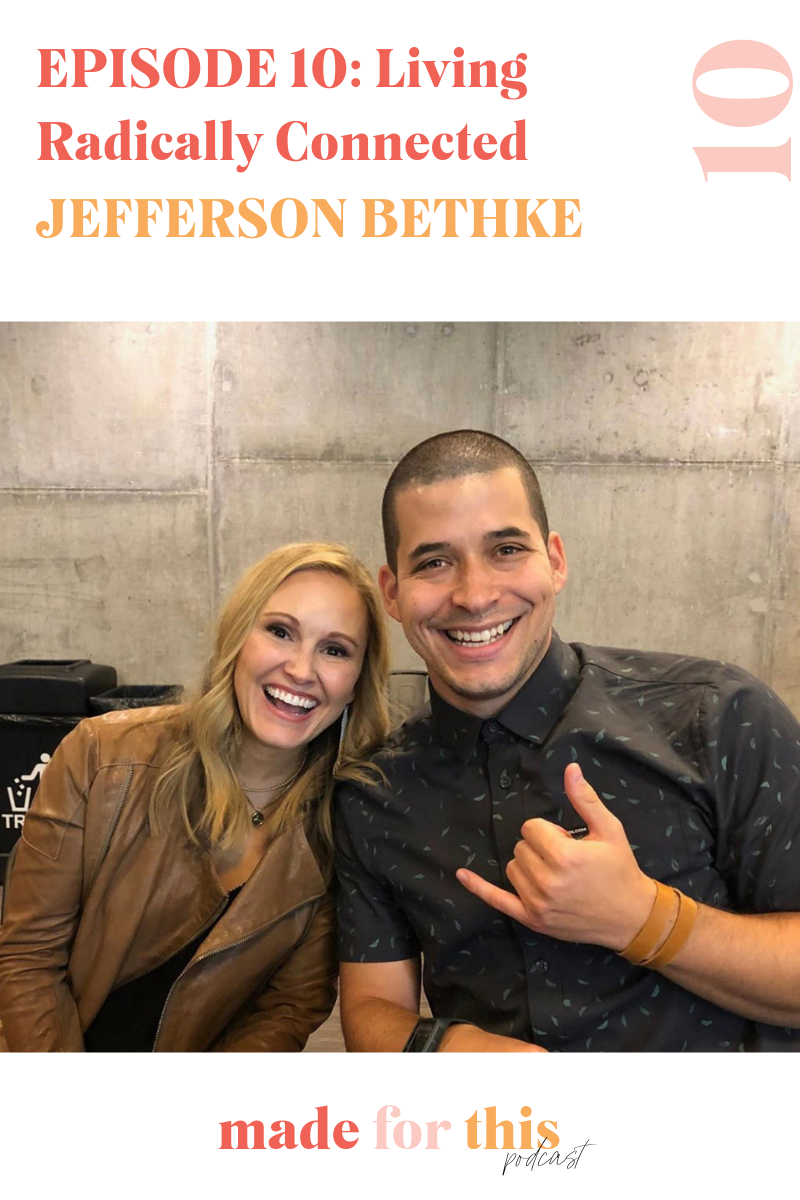Living Radically Connected

July 27, 2019
Jennie Allen
Bible teacher, founder of IF:Gathering
 Listen to "Made For This with Jennie Allen" on Spreaker.
Listen to "Made For This with Jennie Allen" on Spreaker.The topic of radical community is something I've been learning a lot about. Jefferson Bethke feels like a brother to me, and he is living this out in such radical ways. This episode got me so excited about living in deep, authentic community and I hope you get a taste of what I've learned from this friendship over the past few years!
SWIMMING UPSTREAM
The reason I wanted Jefferson to come on this podcast is his passion for going against the grain, especially when it comes to his family. He has a conviction to raise and lead his family differently. Here's what Jefferson had to say about his theology of family:
"In the West, the water we're swimming in is individuality. We have set up a worldwhere the goal is individualism. It is the highest ideal. An individual's freedom, rights, satisfaction, desires, and the fulfilment of everything the individual wants is the most important. But then you go to Genesis, and we always talk about how the image of God is us individually and personally and because we've westernized the text, but when you look in Genesis, what God's trying to do is he creates image-bearers, plural. These image-bearers are meant to bring his goodness, his beauty, his blessing into the world and continue this God project he spun into existence. He didn't need our help, but he left it a little undone so he could co-labor with him. When you bring these image-bearers into the picture, this is actually a very, very, very big project. You need a lot of help. He first makes them man and women, then he tells them to have a lot of babies. Then he gives them a mission - go create, subdue, bring order out of chaos. So what we see from the first page of scripture is God's intent. God's plan A for bringing blessing into the world was actually a multi-generational, family team on mission."
This goes against the American way and everything we're trained to think about. We're taught to be incredibly independent and to not rely on anyone. But God has made us to be in deep community where we need each other, and part of that structure is family. Now, to address the elephant in the room, you don't have to be married to live out this mission. We think of family as our nuclear family, but Jefferson actually has a much bigger picture in mind.
RUN IN YOUR LANE
"Whether you're single or married, you're part of a family last time I checked. The reason we're getting scared sometimes when we hear that is we're so individualistic.Again, the reason for that is, no matter what season you're in. Whether you're a kid, a teenager, an adult, wherever you are, you're a part of a story and you're a part of a legacy and you're a part of a last name that goes back hundreds and hundreds of years."
We all have a family we are a part of, no matter our relationship status. If we don't have family tied to our heritage, we are all adopted into the family of God. Jefferson gives a beautiful picture of how each person, no matter your season of life, contributes to the mission God has for us.
"I think what we see in the New Testament is that one of the primary ways for the gospel to spread is for people to stay in their lane well. What I see in the New Testament is two very even, equal ministry paths. The one of singleness and the one of marriage. Another way to think about it is almost like this double-helix DNA spinning together into God's kingdom. It seems to me like some are sent out and scattered and some are anchored. That feels like an army. You have the outpost and the army. The outpost is the place you go for refreshment, hospitality, renewal, resources, stability. Then the army is also the people who get pushed out and fight and do the work of the kingdom. Of course families are part of the army as well. I think that's hidden in plain sight too. The scripture clearly has a couple different lanes, and I just think whatever season we're in currently, put yourself in that lane and run well, and that's where we find God's blessing."
RADICAL COMMUNITY
I experienced this level of community when we went to Rwanda recently with Cooper. They live in modern day villages. Everyone knows everyone. We told Cooper to ask some of the kids about their lives and get to know them, and he joked, "mom, that would be like stalking someone!" Then Pastor Fred from Rwanda got on his level and said "we don't live that way. We live invading each other's lives. We live asking each other deep questions and knowing each other. We live as if we live in a village and we care about each other."
HOW DID WE GET HERE?
This idea of radical community isn't just something from Jesus' times. This level of connection is present in many cultures today, and it's so much better. They aren't just individuals, they are a community. Jefferson is actually writing a book on this very topic, and he had a lot of insight on how America became such an individualistic culture.
"This individualistic culture is the logical conclusion of the last 50 years. Even our home infrastructure, the homes we've built. You can go back to the turn of the 20th century, and front porches stop showing up. What shows up more? Backyards. More square footage inside. It's interesting that we don't actually believe that that affects us. We were a multi-generational family living country. Grandparents, parents, kids all lived in one home, single, married, etc. until about the turn of the century. Then you know what changed that? Not for particular needs, not for some good moral reason, not because someone was introverted, it can be traced back to the Sears Catalogue. Capitalism drove this one. They needed more customers. They did some marketing to convince the newly-married couple that they need to move out of that multi-generational house and get a new house. Boom all the sudden 100 years later and we're basically all sitting in thousands of square feet for 3 of us by ourselves. We don't know our neighbors, we don't know our street, we don't know our church. Space matters. Our neighborhood matters. How we orchestrate our home matters. It all matters because it facilitates or hurts relationship. If we think through that in a beautiful way, God could do something really cool with it."
WHAT NEXT?
So how do we live this out practically? We might not live in Rwandan villages, but we can still experience this level of community in really simple ways. Here are a few of Jefferson's suggestions:
Get out of your home. Leave it. Don't go anywhere, but go out in the front yard, the common space, the communal area.
Jefferson made a great point about the way we do discipleship sometimes. We want to take someone to Starbucks for an hour instead of inviting them to our dinner table, because inviting someone into our home might expose us. They might see us get frustrated with our spouse or our children. But that's real life, and we have to invite people in. Letting them see the entire span of our lives, not just the pretty part, is the true call to discipleship.
2. Diversify your friend group. Stop only hanging out with people that are your age, like the same things as you.
Go pursue older and Godlier people. People that look different than you. They can teach you a lot. Jefferson even did that with Zac and I when we went out to dinner. He came with questions and it was AWESOME. It made us feel valued and brought such life-giving conversation. These can be some of the most life-giving, fun relationships in my experience.
I love what Jefferson said about how we go about this.
"We also have to dismantle the lie that the older person is supposed to invite us in... Don't try to make their life tougher, try to make their life easier. Don't intimidate them by saying, "will you be my mentor?" I think that's one of the worst questions ever. Just don't ever say that word. What I would say is, "Can I buy you lunch? Can I file some papers for you at work? Anything of value. And while I'm doing that, can I ask you some questions?" 9/10 times it goes really well. Offer them value and then ask questions. Practically, once you get in front of people, get to know them as a person. You're not trying to extract data. You're trying to learn and grow in Jesus. So I always ask them questions about whatever season of life I'm in, what was it like when you were 30? What was it like when you got your first job? What is one of the most difficult things you've done? When you hit a bump in the road, what do you do? I think those questions, they seem to lead to really good places."
This is a completely other way of living in our individualistic, isolated society. These are things we will have to seek out, they won't come naturally. But this is the way God has designed us to live. Finding deep, lasting community and connection takes work, but it is completely worth it.









